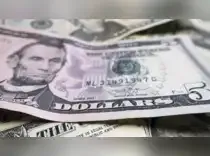The U.S. dollar rose on Friday on more signs of upheaval in the global trade landscape, as U.S. President Donald Trump announced more tariffs and said he planned to impose blanket levies of 15% or 20% on most trade partners.
Most currencies initially held to tight ranges early in the Asian trading session, though the dollar later gained ground on the back of Trump's latest comments which added to the uncertainty around his evolving trade policy.
The Canadian dollar was among the biggest losers, falling more than 0.5% to 1.3726 per U.S. dollar after Trump announced a 35% tariff rate for goods imported from Canada, starting August 1.
Trump on Thursday also said the European Union could receive a letter on tariff rates by Friday, throwing into question the progress of trade talks between Washington and the bloc.
The euro fell 0.25% to $1.1671 and was headed for a weekly decline of nearly 1%.
The risk-sensitive Australian dollar also slipped 0.31% to $0.6568 as the overall market mood turned sour.
"The tariff headlines so far have been largely ignored, but Canada's... It's something which I don't think the market was braced for," said IG market analyst Tony Sycamore.
"Canada finds itself in the firing line and it's obviously not the end of the week we wanted to see, so you'd expect to see risk assets fall because there is a risk of escalation from several parties."
Brazil's President Luiz Inacio Lula da Silva said he wanted to find a diplomatic solution to Trump's threat of 50% tariffs on Brazilian imports, but vowed to reciprocate like-for-like if they take effect on August 1.
The Brazilian real was last little changed at 5.5321 per dollar, though was set to lose 2% for the week - its steepest weekly decline in nearly five months.
Elsewhere, sterling was down 0.22% at $1.3551, reversing slight gains from earlier in the session, and was set to lose more than 0.6% for the week.
The New Zealand dollar fell 0.32% to $0.6013 and the yen eased 0.13% to 146.44 per dollar.
The Japanese currency was headed for a weekly decline of more than 1%, after Trump slapped Tokyo with 25% tariffs earlier this week.
While the market reaction to Trump's slew of tariff announcements this week had been largely muted compared to the manic post "Liberation Day" selloff in April, investors remain on tenterhooks over the outlook for global trade and whether Trump's August 1 deadline is final.
That has in turn kept the dollar supported, and against a basket of currencies, the greenback was last up 0.2% at 97.77 and set to end the week with a 0.8% gain.
"For the moment, I think the uncertainty is just playing to a little bit of U.S. dollar stability, and I wouldn't be too surprised if that holds for another couple of weeks," said Ray Attrill, head of FX research at National Australia Bank.
In cryptocurrencies, bitcoin was last up 1.8% at $115,609.10, holding near a record high of $116,746.70. Ether jumped more than 4% to touch a five-month high of $2,998.41.
Most currencies initially held to tight ranges early in the Asian trading session, though the dollar later gained ground on the back of Trump's latest comments which added to the uncertainty around his evolving trade policy.
The Canadian dollar was among the biggest losers, falling more than 0.5% to 1.3726 per U.S. dollar after Trump announced a 35% tariff rate for goods imported from Canada, starting August 1.
Trump on Thursday also said the European Union could receive a letter on tariff rates by Friday, throwing into question the progress of trade talks between Washington and the bloc.
The euro fell 0.25% to $1.1671 and was headed for a weekly decline of nearly 1%.
The risk-sensitive Australian dollar also slipped 0.31% to $0.6568 as the overall market mood turned sour.
"The tariff headlines so far have been largely ignored, but Canada's... It's something which I don't think the market was braced for," said IG market analyst Tony Sycamore.
"Canada finds itself in the firing line and it's obviously not the end of the week we wanted to see, so you'd expect to see risk assets fall because there is a risk of escalation from several parties."
Brazil's President Luiz Inacio Lula da Silva said he wanted to find a diplomatic solution to Trump's threat of 50% tariffs on Brazilian imports, but vowed to reciprocate like-for-like if they take effect on August 1.
The Brazilian real was last little changed at 5.5321 per dollar, though was set to lose 2% for the week - its steepest weekly decline in nearly five months.
Elsewhere, sterling was down 0.22% at $1.3551, reversing slight gains from earlier in the session, and was set to lose more than 0.6% for the week.
The New Zealand dollar fell 0.32% to $0.6013 and the yen eased 0.13% to 146.44 per dollar.
The Japanese currency was headed for a weekly decline of more than 1%, after Trump slapped Tokyo with 25% tariffs earlier this week.
While the market reaction to Trump's slew of tariff announcements this week had been largely muted compared to the manic post "Liberation Day" selloff in April, investors remain on tenterhooks over the outlook for global trade and whether Trump's August 1 deadline is final.
That has in turn kept the dollar supported, and against a basket of currencies, the greenback was last up 0.2% at 97.77 and set to end the week with a 0.8% gain.
"For the moment, I think the uncertainty is just playing to a little bit of U.S. dollar stability, and I wouldn't be too surprised if that holds for another couple of weeks," said Ray Attrill, head of FX research at National Australia Bank.
In cryptocurrencies, bitcoin was last up 1.8% at $115,609.10, holding near a record high of $116,746.70. Ether jumped more than 4% to touch a five-month high of $2,998.41.








